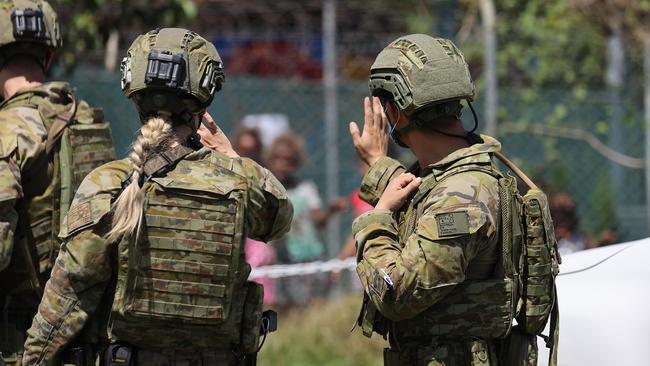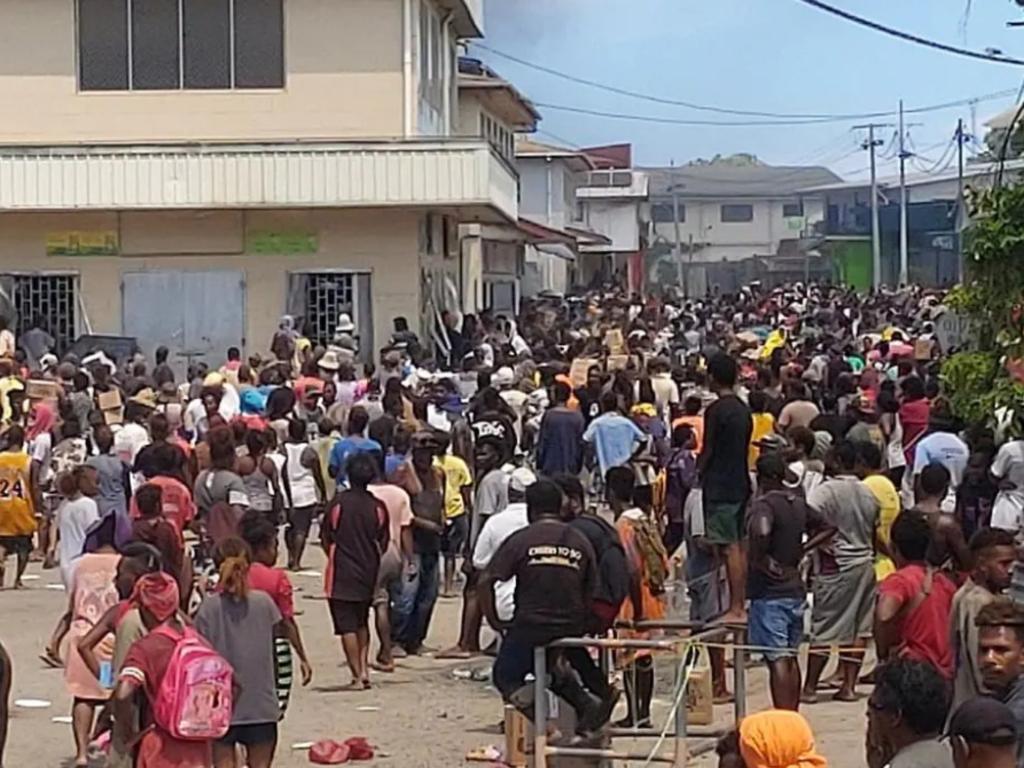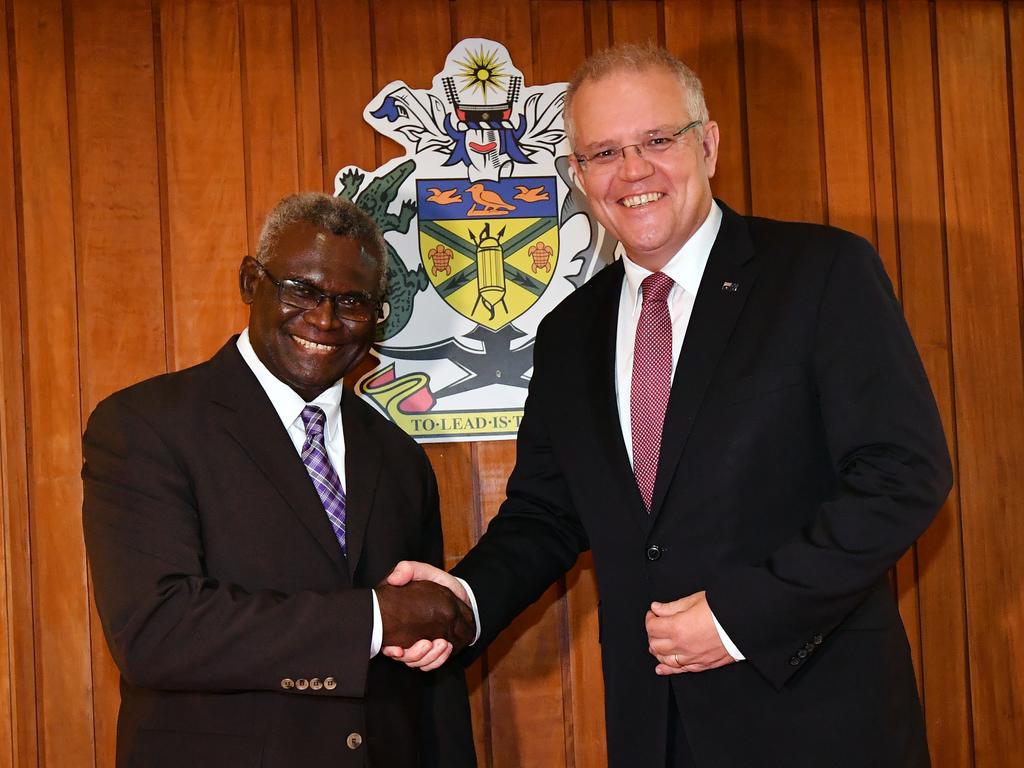
Residents of the impoverished Pacific island nation’s capital emerged from 36 hours of lockdown at the weekend to smouldering buildings, looted shops and streets piled with debris.
Three people died in the violence and the bill for three days of rioting is at least $30m, though the widespread damage is expected to cause prolonged suffering through food shortages and higher unemployment.
A considerable chunk of those losses will also be borne by the country’s Chinese diaspora, whose businesses in Chinatown and elsewhere were once again targeted by looters.
Still, Australia’s quick response – triggered by our commitments under a 2017 bilateral security treaty with the Solomon Islands that obliges us to render assistance in the event of a major security challenge or humanitarian disaster – likely averted further tragedy.
The Solomon Islands’ Chinese community is highly vulnerable in any unrest because they lack the kinship ties to insulate them from violence, says Lowy Institute Pacific Island program director Jonathon Pryke. “There’s a lot of resentment in Pacific countries towards the Chinese community for perceived economic colonialism – a ‘they take our jobs’ mentality.”
Yet, rather than acknowledge Australia’s role in preventing further violence that would likely have targeted its own citizens, China has accused Canberra of fomenting the unrest through another tub-thumping editorial in the Global Times.
“Defending against China’s influence into the South Pacific has been an outstanding geopolitical consideration of the US and Australia, which has been welcomed and longed by the Taiwan authorities, because four of the remaining 15 countries that keep ‘diplomatic ties’ with Taiwan are in the South Pacific – and the future to consolidate such ties is uncertain,” its Sunday editorial claimed.
“It is clear that Australia’s overall attitude, and that of the US, is to connive with and even encourage the unrest, even though the Australian troops and police were sent to keep order in the Solomon Islands. What is right and what is not is obvious.”
Scott Morrison’s insistence that Australia would assist its neighbour to restore peace and stability but would seek “no part in the internal issues of the Solomon Islands” was somehow evidence of Canberra’s “support for the evil doings”, the Beijing mouthpiece claimed.
Prime Minister Sogavare has also alleged the tensions were sparked by “foreign powers” opposed to his 2019 decision to switch the Solomons’ diplomatic allegiance from Taiwan to China and this was behind the disturbances, though he refused to elaborate.
As Honiara burned, he told reporters external pressures were a “very big ... influence. I don’t want to name names. We’ll leave it there.”
Few Solomon Islanders are buying that, and anger at the government – which many see as corrupt and beholden to Beijing – spilled over into direct attacks on the parliament and Sogavare’s own residence last week. Calls for his resignation and a vote of no confidence in his leadership could provoke still further unrest.
But the current violence is rooted in a more complex set of circumstances than simply geopolitical tensions, which Pryke says are more likely to have been the “spark than the driver”.
Many Solomon Islanders are frustrated at the ongoing Covid restrictions, at widespread youth joblessness and inter-island tensions over perceived economic advantages enjoyed by the residents of the capital Honiara over those in the more populous Malaita Island.
What started as a peaceful protest in Honiara by people mostly from Malaita – whose provincial government has maintained allegiance to Taiwan despite the national government’s switch to China – turned violent on Wednesday, prompting the government to seek Australia’s assistance and trigger its treaty obligations.
How long Australian peacekeepers will remain in the restive Pacific nation, alongside a contingent of Papua New Guinean soldiers and potentially also Fijian troops, is an open question.
The last time they were deployed under the Regional Assistance Mission to Solomon Islands (RAMSI) in 2003 – a partnership between the people and government of Solomon Islands and 15 contributing Pacific region nations including Australia – they stayed 14 years.
Unlike many foreign military interventions, the RAMSI mission was popular with Solomon Islanders who saw our police and soldiers as a positive force for security and stability. Few wanted them to leave. Even Sogavare, an early critic of the RAMSI mission, was a convert by the time Australian and other Pacific security personnel withdrew in 2017, leaving behind a bilateral treaty that established a basis for future Australian assistance.
Faced with yet another security crisis, the Solomon Islands has again turned to Australia, which has not hesitated to honour its commitment to render aid to a neighbour.
Rather than making irrational accusations, Beijing could do worse than follow our lead.
Amanda Hodge is The Australian’s Southeast Asia correspondent.





Australia’s rapid deployment of more than 100 troops and police to the Solomon Islands – following a request from Prime Minister Manasseh Sogavare to Scott Morrison on Thursday – has already helped quell days of violent rioting in the capital Honiara.